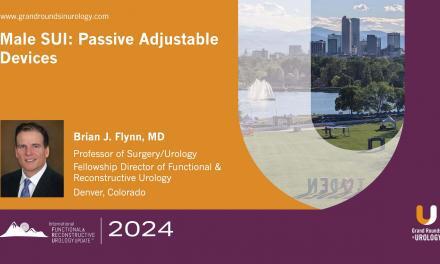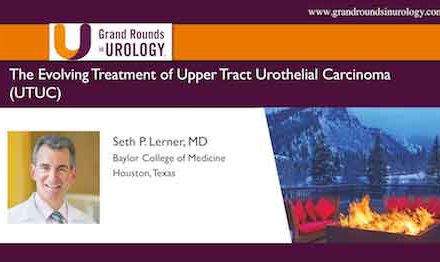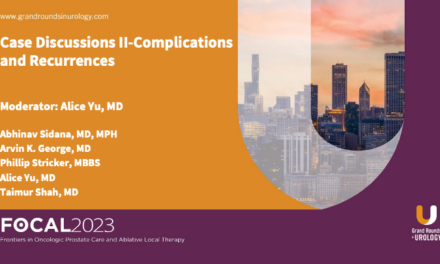Aditya Bagrodia, MD, FACS, presented “Cystectomy vs. Trimodal Therapy for Muscle Invasive Bladder Cancer – Cystectomy” during the 30th Annual Perspectives in Urology: Point-Counterpoint, on March 10, 2023, at Humphreys Half Moon Inn, San Diego, California.
How to cite: Bagrodia, Aditya. “Point-Counterpoint: Cystectomy vs. Trimodal Therapy for Muscle Invasive Bladder Cancer – Cystectomy.” March 10, 2023. Accessed Feb 2026. https://grandroundsinurology.com/point-counterpoint-cystectomy-vs-trimodal-therapy-for-muscle-invasive-bladder-cancer-cystectomy/
Point-Counterpoint: Cystectomy vs. Trimodal Therapy for Muscle Invasive Bladder Cancer – Cystectomy – Summary
Aditya Bagrodia, MD, FACS, discusses the standard treatment for muscle-invasive bladder cancer, cystectomy, focusing on the effectiveness of cystectomy in comparison to trimodal therapy. He highlights the weaknesses of trimodal therapy, focusing on the importance of selecting highly suitable candidates for trimodal therapy, emphasizing factors such as tumor size, absence of extra bladder disease, proper bladder function, and lymph node evaluation.
Dr. Bagrodia presents data from German and Mass General Hospital experiences, demonstrating the negative outcomes of trimodal therapy. The results show that while trimodal therapy can achieve disease-free status in about two-thirds of patients initially, a significant proportion may require subsequent treatment, including cystectomy. Cancer-specific and overall survival rates at 10 years vary depending on the extent of the disease, with more advanced stages showing a decline in outcomes. The study also compares these outcomes to those of cystectomy, highlighting the higher recurrence-free survival rates associated with organ-confined disease and the potential benefits of neoadjuvant chemotherapy.
Overall, the data suggests that highly selected patients receiving cystectomy may have better outcomes compared to those receiving trimodal therapy. However, individual patient characteristics and preferences should be considered when deciding the most appropriate treatment approach.
This lecture is part of a Point-Counterpoint debate. Its opposing lecture is “Point-Counterpoint: Cystectomy vs. Trimodal Therapy for Muscle Invasive Bladder Cancer–Trimodal Therapy.”
About the 30th Annual Perspectives in Urology: Point Counterpoint conference: Presented by Program Chair and Grand Rounds in Urology Editor-in-Chief E. David Crawford, MD, this conference brought together leading experts in urology, medical oncology, and radiation oncology to discuss and debate the latest topics in genitourinary cancers, primarily prostate cancer and bladder cancer. This interactive conference offered topical lectures, pro/con debates, interesting-case presentations, interactive panel discussions, and interactive audience and faculty networking.
ABOUT THE AUTHOR
Aditya Bagrodia, MD, FACS, is a Professor of Urology and the Disease Team Co-Leader for Genitourinary Cancer at the University of California, San Diego. Dr. Bagrodia’s clinical and research interests on understanding molecular attributes of germ cell tumors, which cause testicular cancer, with the goal of ultimately improving treatments and clinical care. He also has been actively involved in understanding and overcoming societal and epidemiological barriers to optimal care in testicular cancer patients. He also has expertise in minimally invasive approaches to urologic surgery.





